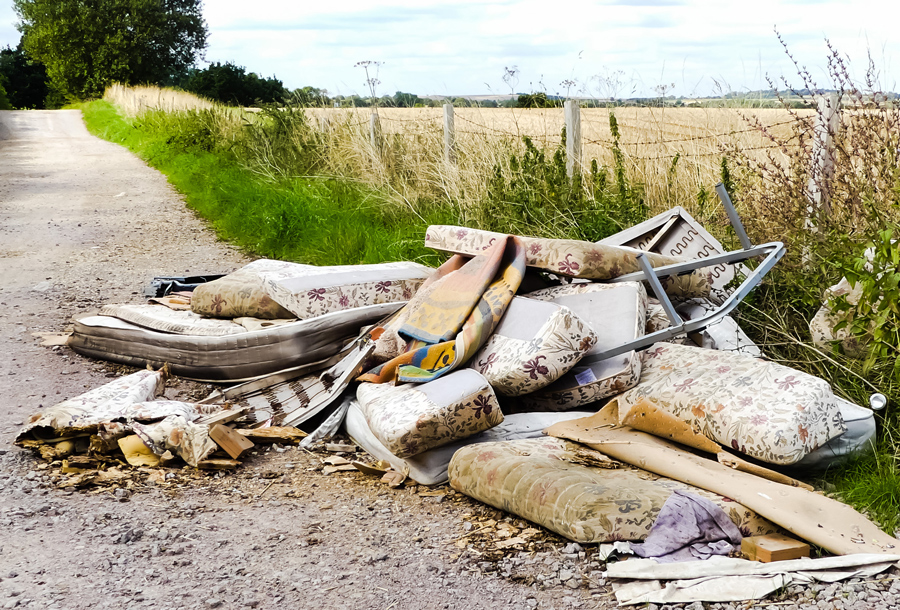Rural fly-tipping figures on the rise
15th February 2020
The continued rise of large fly-tipping incidents across England affects two thirds of farmers, with the clean-up cost per incident averaging at £1,000 per landowner, the National Rural Crime Network

The continued rise of large fly-tipping incidents across England affects two thirds of farmers, with the clean-up cost per incident averaging at £1,000 per landowner, the National Rural Crime Network has revealed.
Countryside communities have long been the target for offenders dumping their rubbish in isolated locations, with an eight per cent increase in fly-tipping crimes since 2018, and an estimated annual cost of £150m to the UK economy.
However, Viv Vivers, of Farmers and Mercantile Insurance Brokers, warned the figures did not reflect the full scale of the problem for farmers and landowners, as most cases on private land go unreported. “Fly-tipping is a scourge on the farming community and their plight is not reflected in these figures as they exclude the majority of private-land incidents,” said Ms Vivers. “Councils spend millions every year on clean-up costs but private land-owners, such as farmers, are suffering in silence with little or no assistance or recourse. The burden of dumped rubbish falling squarely with farmers as they are liable for clearing it up at their own expense, or face prosecution. Moving the mess on to public land will not solve the issue, but exacerbate it, which farmers need to be mindful of.”
The CLA’s Yorkshire rural advisor, Libby Bateman, said: “Our members are all too tired of not only cleaning up other people’s rubbish but paying for the privilege of doing so.” She also commented that a more co-ordinated approach was needed. “The introduction of fees at many rubbish tips and recycling centres has meant we’re now seeing the rise of organised criminal fly-tipping. It is repeated and growing in scale and it is vital that rural police forces recognise the changing nature of this crime and respond accordingly.”
This month, a group of Welsh farmers won private prosecution against the fly-tippers who dumped piles of rubbish on land, where their sheep graze. Members of the Coity Wallia Commoners’ Association faced clearing the mess themselves, but instead employed a group of lawyers to look through the debris and track down the true culprits – who paid to clear it up.
The group are urging others to take private legal action to cover the cost of clean-ups, which in turn would help to prevent mass fly-tipping. “The message is out there so people know that if they carry out this action of fly-tipping they will not get away with it and they can be penalised for their actions in this way,” said Aled Owen, from legal firm Harrison Clark Rickerbys. The local council said the authorities were not allowed to use public money to clear fly-tipping from privately run land, but they would provide as much support as possible to help identify offenders and ensure that further action can be taken.
NFU’s 6 suggestions for protecting your land from fly-tipping :
1) Restricting access to your land by installing gates or physical barriers (strategically placed earth bunds, tree trunks, boulders etc.) to prevent access to the land, ideally in keeping with the natural environment. Make sure that when erecting any form of barrier you are not permanently blocking a public right of way.
2) Make sure gates are closed and, if possible, locked when not in use.
3) Improving visibility so that fly-tippers are not hidden from view. Fly-tippers prefer to commit their crimes out of sight.
4) Install or improve lighting if possible.
5) Consider placing appropriate deterrent signage and CCTV cameras.
6) Swiftly clear any waste that is dumped to remove any encouragement for others to add to it.
Source : NFU online


